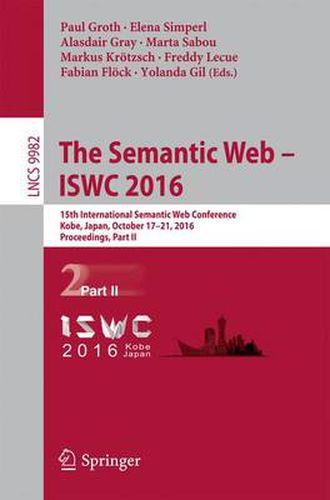Readings Newsletter
Become a Readings Member to make your shopping experience even easier.
Sign in or sign up for free!
You’re not far away from qualifying for FREE standard shipping within Australia
You’ve qualified for FREE standard shipping within Australia
The cart is loading…






This title is printed to order. This book may have been self-published. If so, we cannot guarantee the quality of the content. In the main most books will have gone through the editing process however some may not. We therefore suggest that you be aware of this before ordering this book. If in doubt check either the author or publisher’s details as we are unable to accept any returns unless they are faulty. Please contact us if you have any questions.
The two-volume set LNCS 9981 and 9982 constitutes the refereed proceedings of the 15th International Semantic Web Conference, ISWC 2016, which was held in Kobe, Japan, in October 2016. The 75 full papers presented in these proceedings were carefully reviewed and selected from 326 submissions. The International Semantic Web Conference is the premier forum for Semantic Web research, where cutting edge scientific results and technological innovations are presented, where problems and solutions are discussed, and where the future of this vision is being developed. It brings together specialists in fields such as artificial intelligence, databases, social networks, distributed computing, Web engineering, information systems, human-computer interaction, natural language processing, and the social sciences.
The Research Track solicited novel and significant research contributions addressing theoretical, analytical, empirical, and practical aspects of the Semantic Web. The Applications Track solicited submissions exploring the benefits and challenges of applying semantic technologies in concrete, practical applications, in contexts ranging from industry to government and science. The newly introduced Resources Track sought submissions providing a concise and clear description of a resource and its (expected) usage. Traditional resources include ontologies, vocabularies, datasets, benchmarks and replication studies, services and software. Besides more established types of resources, the track solicited submissions of new types of resources such as ontology design patterns, crowdsourcing task designs, workflows, methodologies, and protocols and measures.
$9.00 standard shipping within Australia
FREE standard shipping within Australia for orders over $100.00
Express & International shipping calculated at checkout
This title is printed to order. This book may have been self-published. If so, we cannot guarantee the quality of the content. In the main most books will have gone through the editing process however some may not. We therefore suggest that you be aware of this before ordering this book. If in doubt check either the author or publisher’s details as we are unable to accept any returns unless they are faulty. Please contact us if you have any questions.
The two-volume set LNCS 9981 and 9982 constitutes the refereed proceedings of the 15th International Semantic Web Conference, ISWC 2016, which was held in Kobe, Japan, in October 2016. The 75 full papers presented in these proceedings were carefully reviewed and selected from 326 submissions. The International Semantic Web Conference is the premier forum for Semantic Web research, where cutting edge scientific results and technological innovations are presented, where problems and solutions are discussed, and where the future of this vision is being developed. It brings together specialists in fields such as artificial intelligence, databases, social networks, distributed computing, Web engineering, information systems, human-computer interaction, natural language processing, and the social sciences.
The Research Track solicited novel and significant research contributions addressing theoretical, analytical, empirical, and practical aspects of the Semantic Web. The Applications Track solicited submissions exploring the benefits and challenges of applying semantic technologies in concrete, practical applications, in contexts ranging from industry to government and science. The newly introduced Resources Track sought submissions providing a concise and clear description of a resource and its (expected) usage. Traditional resources include ontologies, vocabularies, datasets, benchmarks and replication studies, services and software. Besides more established types of resources, the track solicited submissions of new types of resources such as ontology design patterns, crowdsourcing task designs, workflows, methodologies, and protocols and measures.